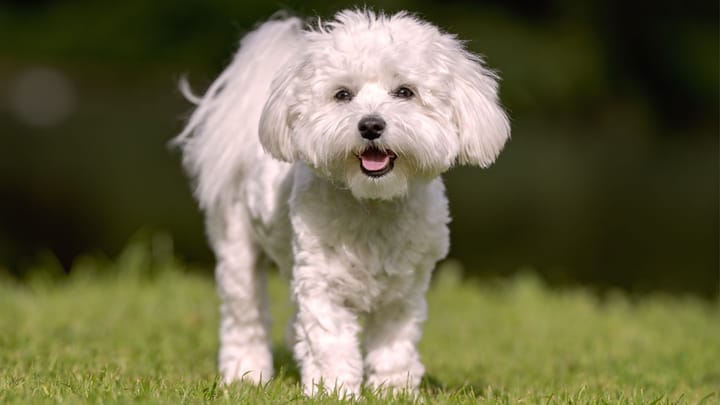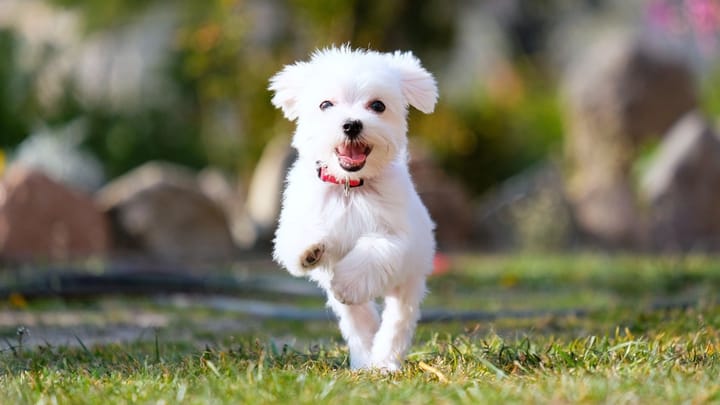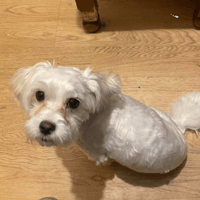Maltese


Maltese are small, cute, affectionate and very close to members of their family. They love being with them and don't like spending too much time alone. Their ideal owners should be present and available for them as often as possible. Docile, intelligent and happy, training them is easy and pleasant - don’t think the latter isn’t necessary simply because they're small.
|
Life expectancy |
The Maltese has a life expectancy of between 12 and 15 years |
|
Temperament |
|
|
Size |
Small
|
|
Adult size |
Female
Between 8 and 9 in
Male
Between 8 and 10 in
|
|
Adult weight |
Female
Between 7 and 9 lb
Male
Between 7 and 9 lb
|
|
Coat colour
The coat should be pure white but the breed’s official standards also recognise pale ivory. |
White |
|
Type of coat
His coat is very long (up to 8 inches). His head, torso, tail and limbs are covered in silky, very long fur. His coat is straight, never wavy or curly. |
Long |
|
Eye colour
His iris is dark ochre. |
Brown
|
|
Purchase price |
The Maltese costs between £770 and £1100 |
This little snowball is a hypoallergenic dog. They are therefore particularly good for people allergic to dog hair and saliva, or even houseproud people looking for a pet that won’t moult all over the place.
More details about the Maltese
Maltese: Origins and history
The Maltese is an ancient dog, dating back to 500 BC. He was particularly popular among Roman women. Against all odds, his Maltese name actually has nothing to do with the island of Malta, and instead originates from the word “Màlat”, meaning “refuge” or “port” in the Semitic language (spoken in the Mediterranean). Unsurprisingly, the Maltese’s ancestors lived largely in Mediterranean ports, and were tasked with chasing away mice and other pests. The Maltese dog has therefore been around for thousands of years in the Mediterranean, particularly in Italy.
Physical characteristics of the Maltese
The Maltese is a small dog whose body is one-third longer than his height at the withers, making him look narrow and long. His skull is flat, his eyes are round and very dark, while his ears are triangular, worn high on his head and hang down on the sides of his face, covered in fur. His limbs are short, straight and very furry. His tail is aligned with his rump. His physique constitutes one long curve, finishing at the rump between his hips; he has very long hair that touches the back of his knees.
FCI classification of the Maltese
-
Group 9 - Companion and Toy Dogs
-
Section 1 : Bichons and related breeds
Maltese: Characteristics
Maltese: Behaviour
Training a Maltese
Intelligent, lively and docile, the Maltese is very friendly and easy to train if you take the time to teach him the basics from when he’s a puppy.
His small size does not justify an omission of training. Even small dogs must have limits, rules, and a basic education to properly integrate into the household, but also into society more generally.
Therefore, you should train your Maltese as early as possible, to prevent him from learning bad habits. It’s much easier to learn habits than to ‘unlearn’ them, to then have to relearn new behaviours.
You should pay special attention to teaching him how to be alone, since this dog typically experiences separation very negatively.
Maltese: Lifestyle
Breed compatibility Maltese
Maltese: Purchase price
The price of a Maltese Dog varies according to his origins, age and sex. You should budget around £1110 for a dog registered with the KC.
As for your monthly budget, you should set aside around £20 to be able to meet this little dog’s needs, including food and treatments (vaccinations, deworming, etc.).
Maltese: Shedding
Average
The Maltese dog’s amount of hair loss is relatively minimal. He doesn’t shed during the annual moulting periods, despite what you might think from looking at his thick, long coat.
Maltese: Grooming
The Maltese dog’s grooming should be meticulous and daily, mainly because of his very long coat that can often grow longer than his height at the withers.
He must be brushed and detangled regularly and after every walk, especially if he lives in the countryside.
Like with many little long-haired dogs, many owners choose to cut their Maltese’s hair short at a grooming parlour, which significantly simplifies his daily grooming requirements.
On a weekly basis, you should also clean his eyes to avoid infection, and inspect his ears and teeth.
Maltese: Health
His lifespan is around 13 years.
Despite his small size, the Maltese is quite a robust dog. That said, he is nonetheless predisposed to a number of pathologies.
The heat is less of a problem for this dog than the cold, but you should remain vigilant: make sure he always has access to a bowl of cold water and is able to retreat to a cool shady spot should the need arise.
The Maltese Dog doesn’t tolerate the cold well at all, so you need to be very careful with him when the temperatures drop. He will greatly benefit from a winter coat.
Prone to obesity, it’s important for this dog to enjoy a diet adapted to his physical condition.
- Cancer
- Heart disease
- Congenital portosystemic shunts (birth defect that prevents blood from being cleaned by the liver, leaving toxic waste in the body)
- Shaker dog syndrome (light trembling causing the dog to shake, affecting small white dogs in particular)
- Hydrocephalus (excessive accumulation of cerebrospinal fluid in the brain ventricles or cavities, a disease primarily observed in dwarf breeds)
- Eye infections
- Dislocation of the kneecaps
- Teeth and gum sensitivity






